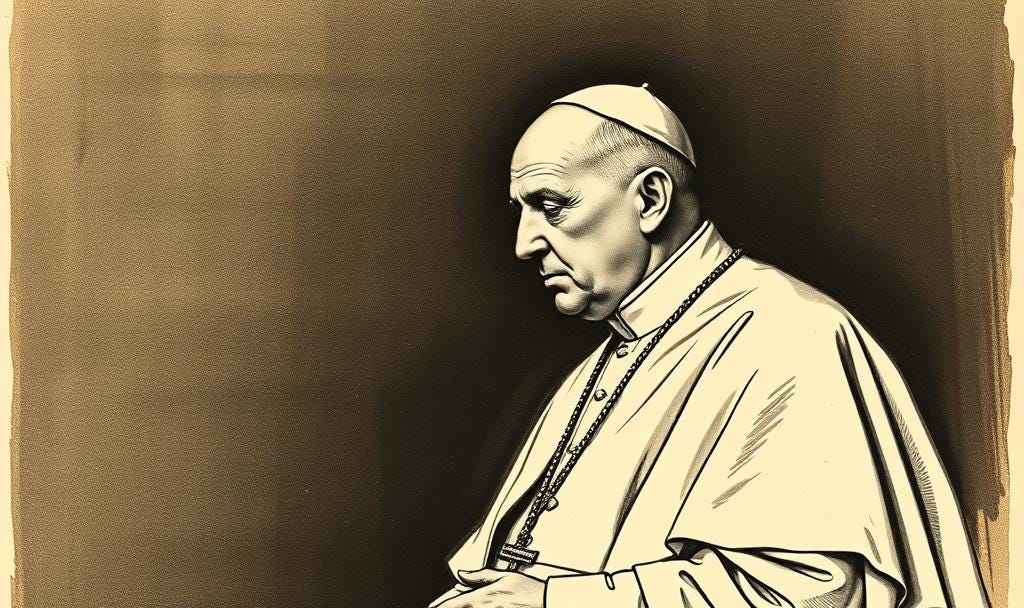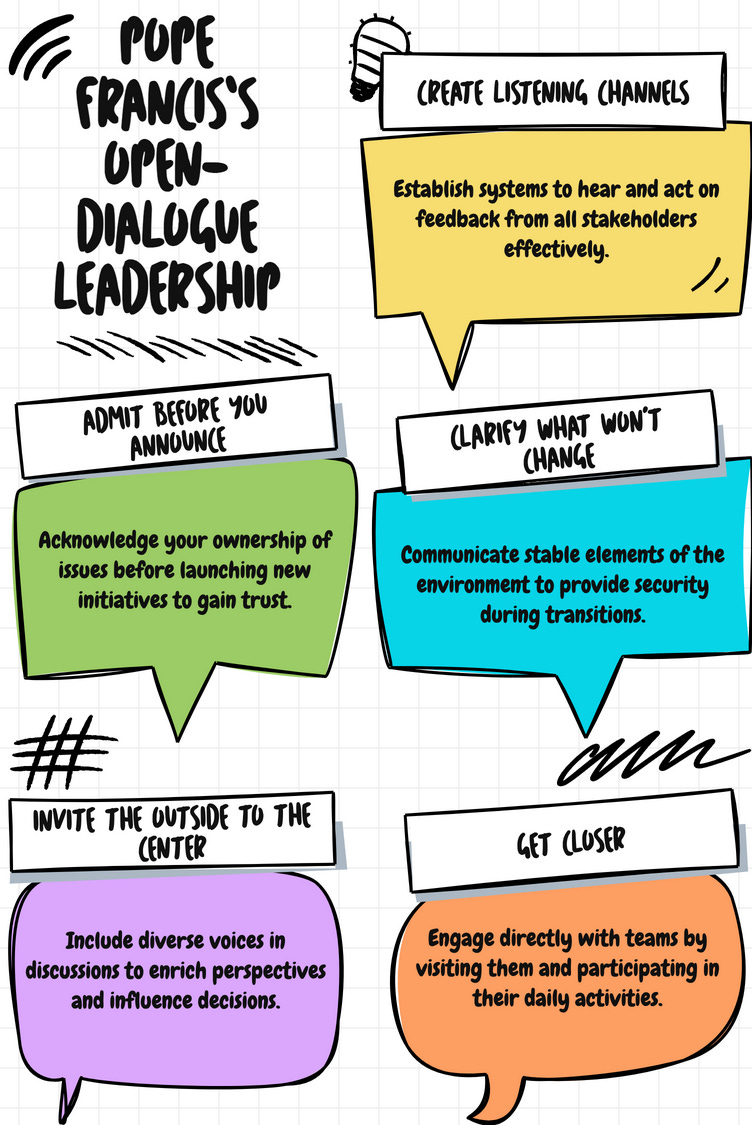Leading with Ears First: What Pope Francis Taught Us About Influence
Why trust is the engine of transformation, and dialogue is the ignition.
On Easter Monday, April 21, 2025, the world bid farewell to Pope Francis, who passed away at the age of 88 in his residence at the Vatican's Casa Santa Marta. Born Jorge Mario Bergoglio in Buenos Aires, Argentina, he made history as the first Jesuit pope, the first from the Americas, and the first non-European pontiff in over a millennium.
Throughout his 12-year papacy, Pope Francis was renowned for his humility, compassion, and unwavering commitment to the marginalized. His leadership emphasized inclusivity, social justice, and environmental stewardship, resonating with millions around the globe.
In honor of his profound impact on the Catholic Church and the world, this article explores the leadership lessons we can glean from Pope Francis's life and ministry. His example challenges us to lead with empathy, to prioritize dialogue over division, and to serve with humility.
“People don’t follow titles. They follow presence.”
A few years ago, I sat on the phone with a pastor who’d just rolled out a bold new vision for his church. He had one-liners, the slides, data..all of it airtight. But a month in, nothing was changing.
He asked me what I thought the issue was.
I asked him one question: “Who did you invite into the conversation before you made the decision?”
He paused.
“Well… no one. But I thought leadership starts with clarity.”
It does. But without trust, clarity sounds a lot like control.
Because when you skip dialogue, you don’t just lose feedback…you lose buy-in. And without buy-in, you’re not leading. You’re managing resistance.
The Pope Who Led with His Ears
Whether you agree with every choice Pope Francis has made or not, here’s what no one can argue: He didn’t just change policies…He changed postures. He didn’t just show up to deliver messages…He listened to those he would speak to first.
He became known for open dialogue in a position where dialogue very rarely engaged in decision making. And that’s a word for every leader trying to create real transformation right now. Whether you're leading a church, a business, a classroom, or a community board.
The secret isn't more control…It’s more conversation.
I love the way James speaks into this exact situation in the first chapter of his letter to believers. We tend to think influence starts when we speak. But biblically, it starts when we listen. Here’s what he writes:
“Let every person be quick to hear, slow to speak, slow to anger.”
— James 1:19 (ESV)
James wasn’t writing to organizational leaders, he was writing to scattered believers navigating tension, persecution, and the complexities of living out their faith in a divided world.
Sound familiar?
His instructions were simple: go slow with your words, fast with your ears. That principle holds just as much weight in the boardroom or church staff meeting as it did in the early Church.
Pope Francis didn’t reshape a 2,000-year-old institution with sweeping speeches.
He reshaped it by making space for voices that had long been overlooked.
And that principle? It works everywhere.
Trust is Built Through Dialogue
“You can’t lead people you refuse to listen to.”
Pope Francis didn't try to modernize the Church by watering down its truth. He modernized its approach by inviting people into a conversation before they walked away for good.
He created listening sessions.
He opened up previously closed circles.
He welcomed tension without fearing it.
Influence doesn't come from having the mic. It comes from creating the table.
When we launched new strategic and ministry models at One City, we didn’t start with programming or strategy. We started with listening sessions. We asked leaders and members alike where the friction was. What we discovered in those conversations shaped our entire launch strategy and saved us from making decisions that looked good on paper but wouldn’t have worked in real life.
It allowed to learn what people really cared about and if there was any disconnect between where we were heading and where we desired to head.
People don’t expect perfection. They expect honesty.
Pope Francis took on institutional failures with something most leaders avoid: public humility. He didn’t deflect. He didn’t excuse. He owned it.
And the result?
The world leaned in.
When leaders go first in humility, they give others permission to go second in honesty.
When we created our leadership values for our staff and leaders, we were intentional with making sure humility was part of those values. And every time a leader on our team goes first in admitting where they got it wrong, it hasn’t made them less respected, but it’s made the culture more honest.
Teams don't need you to be untouchable. They need you to be real.
Leaders Who Listen Create Cultures That Can Handle Growth
When I look at the leadership of Pope Francis during his tenure, my mind has been constantly drawn to this statement: Don’t fix what’s broken. Build what’s missing.
Francis understood a truth many leaders miss. You can’t build trust with a megaphone.
He launched what’s now known as the synodal process which is a Church-wide listening movement where voices from every level (even the previously unheard) were invited into the future.
And it wasn’t performative. It was directive. The Church didn’t just hear ideas. It adjusted based on them.
The best ideas rarely come from the top of the org chart. They come from the experiences of people. And oftentimes, those with the most experience may not be seated at the table of leadership. Sometimes, the greatest feedback you can receive is from the person sitting next to you who is never asked.
Clarity Creates Room for Innovation
People are more open to change when they know what won’t.
Pope Francis made bold moves without compromising core beliefs. That’s what made his leadership so effective. He didn’t blur doctrinal lines. He clarified them. Then he made space for people who had never been in the room before.
When you know the foundation is strong, you're stop being afraid to renovate the house. But if the foundation is vague, any change feels like compromise. That’s why leaders must communicate what’s non-negotiable before inviting what’s adaptable.
Healthy innovation flows from clear identity.
Proximity Transforms More Than Policy Ever Could
You can’t disciple people from a distance. One of the most powerful aspects of Pope Francis’s leadership was his commitment to presence. He didn’t lead from Vatican palace. He stepped into pain of the very people who were impacted by his decisions.
He listened to survivors of traumatic events in the church.
He visited the overlooked who felt like they didn’t belong in the church.
He walked into places most leaders avoid because it can feel uncomfortable.
That proximity gave him credibility that position alone never could.
Presence earns permission. And permission unlocks transformation.
How to Implement Dialogue-Centered Leadership in Your World
Here’s how you can start right now:
1. Create Listening Channels
Whether it’s town halls, feedback forms, or coffee conversations…just build systems for listening. Don’t make people fight to be heard.
2. Admit Before You Announce
Before you roll out that big initiative or culture shift, ask: What do I need to own first?
3. Clarify What Won’t Change
Communicate your non-negotiables. People will only explore change when they feel secure in what’s staying the same.
4. Invite the Edge to the Center
Who’s not in the room right now that needs to be? Add voices before you add vision.
5. Get Closer
Step out of the greenroom. Walk the floor. Visit the teams. Join the mess. That’s where the ministry happens and where credibility is built.
The Legacy You’ll Leave
In a culture that confuses louder leadership with stronger leadership, you’ll stand out by how quietly you lead with conviction. Pope Francis’s legacy won’t be a flashy rebrand. It’ll be a culture shift that started by listening and lasted because it was real.
If you want to lead lasting change in your organization, it starts with something small:
Create space for dialogue. Stay close to the people. And build trust that can carry the weight of transformation.
We are praying for all those grieving this loss and for the future leadership of the catholic church.




